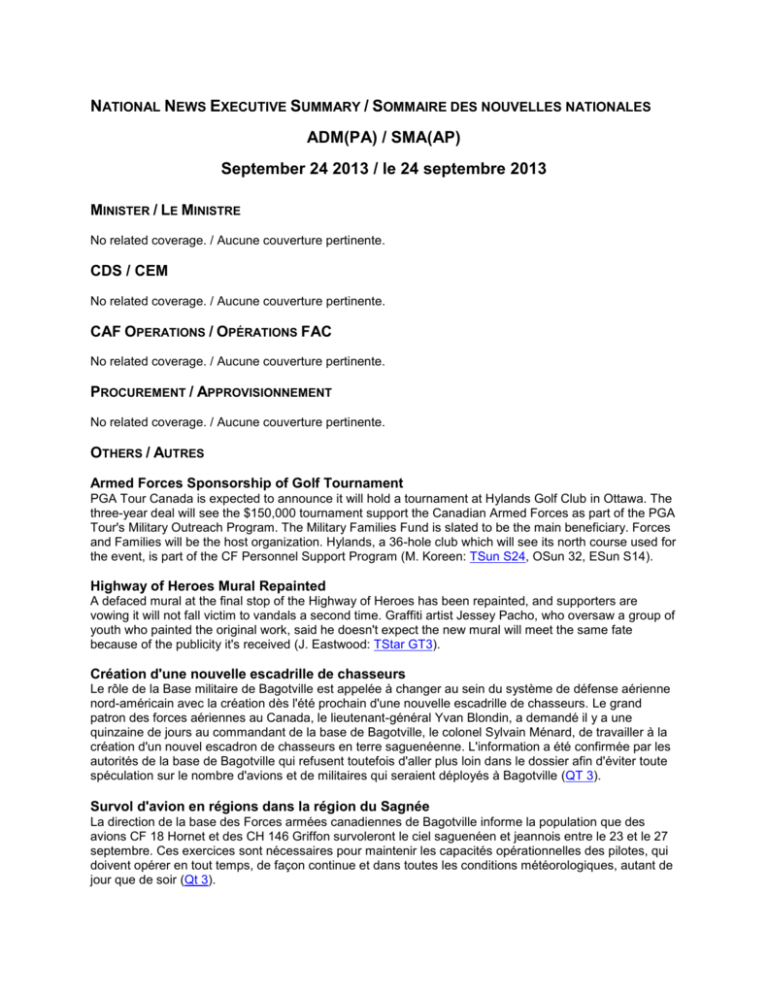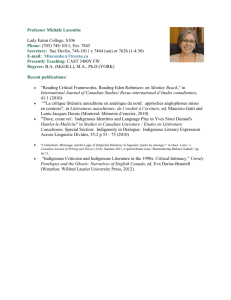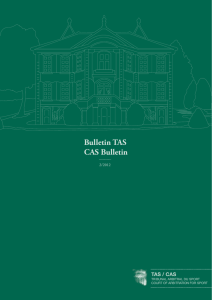executive news summary/sommaire des nouvelles nationales
advertisement

NATIONAL NEWS EXECUTIVE SUMMARY / SOMMAIRE DES NOUVELLES NATIONALES ADM(PA) / SMA(AP) September 24 2013 / le 24 septembre 2013 MINISTER / LE MINISTRE No related coverage. / Aucune couverture pertinente. CDS / CEM No related coverage. / Aucune couverture pertinente. CAF OPERATIONS / OPÉRATIONS FAC No related coverage. / Aucune couverture pertinente. PROCUREMENT / APPROVISIONNEMENT No related coverage. / Aucune couverture pertinente. OTHERS / AUTRES Armed Forces Sponsorship of Golf Tournament PGA Tour Canada is expected to announce it will hold a tournament at Hylands Golf Club in Ottawa. The three-year deal will see the $150,000 tournament support the Canadian Armed Forces as part of the PGA Tour's Military Outreach Program. The Military Families Fund is slated to be the main beneficiary. Forces and Families will be the host organization. Hylands, a 36-hole club which will see its north course used for the event, is part of the CF Personnel Support Program (M. Koreen: TSun S24, OSun 32, ESun S14). Highway of Heroes Mural Repainted A defaced mural at the final stop of the Highway of Heroes has been repainted, and supporters are vowing it will not fall victim to vandals a second time. Graffiti artist Jessey Pacho, who oversaw a group of youth who painted the original work, said he doesn't expect the new mural will meet the same fate because of the publicity it's received (J. Eastwood: TStar GT3). Création d'une nouvelle escadrille de chasseurs Le rôle de la Base militaire de Bagotville est appelée à changer au sein du système de défense aérienne nord-américain avec la création dès l'été prochain d'une nouvelle escadrille de chasseurs. Le grand patron des forces aériennes au Canada, le lieutenant-général Yvan Blondin, a demandé il y a une quinzaine de jours au commandant de la base de Bagotville, le colonel Sylvain Ménard, de travailler à la création d'un nouvel escadron de chasseurs en terre saguenéenne. L'information a été confirmée par les autorités de la base de Bagotville qui refusent toutefois d'aller plus loin dans le dossier afin d'éviter toute spéculation sur le nombre d'avions et de militaires qui seraient déployés à Bagotville (QT 3). Survol d'avion en régions dans la région du Sagnée La direction de la base des Forces armées canadiennes de Bagotville informe la population que des avions CF 18 Hornet et des CH 146 Griffon survoleront le ciel saguenéen et jeannois entre le 23 et le 27 septembre. Ces exercices sont nécessaires pour maintenir les capacités opérationnelles des pilotes, qui doivent opérer en tout temps, de façon continue et dans toutes les conditions météorologiques, autant de jour que de soir (Qt 3). Cyclists Raising Funds for Paramedic Monument Cyclists will complete over 500 km of biking in a fundraiser for the Canadian Paramedic Benevolent Society, which is raising money for a national monument honouring the memory of military and civilian paramedics who die in the line of duty (J. Willing: KWS 8). Tough Mudder Support for Wounded Warrior Project Coverage noted that the Tough Mudder event supports the Wounded Warrior Project, an organization that helps injured military personnel (E. Mathieu: TStar E1). Le Canada appuie Al-Shabab Le Canada appuie discrètement la lutte contre le groupe terroriste somalien Al-Shabab, responsable de l'attaque meurtrière dans un centre commercial de Nairobi au Kenya, le week-end dernier. Selon un document informatif de la Défense,obtenu par La Presse Canadienne en vertu de la Loi sur l'accès à l'information, “le Canada est un observateur actif de l'Union africaine et fournit un appui direct et indirect à la mission”. Le pays contribue aussi indirectement en donnant des formations militaires, deux fois par année au camp Aldershot en Nouvelle-Écosse, à des soldats recrues de 26 pays pour les préparer à mieux réagir aux enfants soldats qui combattent en Afrique (LN 25). Kenya: Comment Matthew Fisher: Al-Shabab, the Somali terrorist group that launched a bloody, audacious attack targeting Kenyans and other Christians at a shopping mall in Nairobi this weekend, was thought to be a spent force. It probably still is, but the co-ordinated attack in the Kenyan capital did what the group desperately needed to do to get out from under suspicion its jihadi quest had failed. Canada can play a bigger role in keeping a lid on al-Shabab by sending more Joint Task Force 2 and Special Operations Regiment troops to East Africa to train and advise the Kenyan army. And it might also be a good idea for Canada to pay even more attention to the behaviour of Somali radicals known to be recruiting in the New World (NP A2, EJ A15, RLP B6, SSP D6, CH B1, VSun B1, Gaz A4, Ctz A2). Back to Top Section: Sports Lead: OTTAWA--Canada's top professional golf tour is on target to return to Ottawa for the first time since 2001. Headline: Ottawa RETURN FOR PGA CANADA Page: S24 Byline: MIKE KOREEN QMI AGENCY Outlet: The Toronto Sun Date: Tuesday 24 September 2013 OTTAWA--Canada's top professional golf tour is on target to return to Ottawa for the first time since 2001. PGA Tour Canada (formerly the Canadian Tour) is expected to announce Thursday it will hold a tournament at Hylands Golf Club from Aug. 4-10, 2014. The three-year deal will see the $150,000 tournament support the Canadian Armed Forces as part of the PGA Tour's Military Outreach Program. The Military Families Fund is slated to be the main beneficiary. Forces and Families will be the host organization. Hylands, a 36-hole club which will see its north course used for the event, is part of the Canadian Forces Personnel Support Program. The 72-hole tourney will be part of a week-long event, which also will feature a couple of proams. The tour last touched down in Ottawa for the 2001 Eagle Creek Classic. While there has been talk of returning to the capital region in previous years, nothing came together until this week. The PGA Tour took over the Canadian circuit this year, tying it into its developmental model --a much-needed boost for the tour. Starting this past season, the top five money winners on PGA Tour Canada automatically go to the Web.comTour the following season. The Web.comTour now awards 50 PGA Tour cards each season. The old model, which saw PGA Tour cards given out at Qualifying School, has been shelved. Now, Q-School simply awards Web.comcards, meaning the top five finishers on PGA Tour Canada can skip school. Back to Top Section: Greater Toronto Byline: Joel Eastwood Toronto Star Outlet: Toronto Star Illustrations: A new Highway of Heroes mural has been painted in an alley behind the coroner's office near Yonge and College Sts. after the previous one was defaced by graffiti taggers. The mural honours Canada's fallen soldiers. JOEL EASTWOOD/TORONTO STAR Headline: Artists reimagine defaced Highway of Heroesmural; Security measures, such as lights or cameras, in the works to prevent vandalism Page: GT3 Date: Tuesday 24 September 2013 A defaced mural at the final stop of the Highway of Heroes has been repainted, and supporters are vowing it will not fall victim to vandals a second time. “We have to make sure that this mural is preserved,” said Chris Ecklund, president of Canadian Heroes, an organization dedicated to raising support for Canadian soldiers. The painting, on the side of a building off Yonge St., was unveiled in 2010. The unassuming alley is the final stop on the journey taken by hearses carrying the remains of fallen Canadian soldiers, from Canadian Forces Base Trenton to the coroner's office on Grenville St. Two weeks ago, the artwork - which featured a dove, wings spread wide, over a field of poppies - was vandalized with spray paint. “It was completely destroyed, from top to bottom, from left to right,” said graffiti artist Jessey Pacho, who oversaw a group of youth who painted the original work. On Sunday, Pacho returned to the site with fellow artist Kedre Brown. The artists primed the defaced wall by painting it black. On that canvas, they set to work with a new design that echoed the imagery of the original mural. “We wanted to keep some of the same sort of elements, because those are specific things that can relate back to our Canadian heroes,” Pacho said. Their new painting features two doves, a Canadian flag and silhouette of a soldier, set against a luminous sky which Pacho described as “a very serene, heavenly cloud feeling.” “It exceeded my biggest and wildest expectations,” said Const. Scott Mills, a Toronto police officer who came up with the idea for the original mural. Ecklund said he plans to install a brass plaque explaining the significance of the site. He said several companies have offered to put a clear coat over the wall to protect it, and also hopes to install other security measures such as a camera or lights. “The families of the fallen that have been here, that have made that terrible trip, going by this mural - this is an extremely important thing for them,” Ecklund said. “They did a good job on it,” said Jina Samuel, who lives in the apartment building next to the alley. Pacho said he doesn't expect the new mural will meet the same fate because of the publicity it's received. “Whoever did it or would have the idea to do it, I think they now realize the magnitude of this mural, and the meaning behind it,” he said. Back to Top Section: Actualités Headline: Un rôle appelé à changer Page: 3 / FRONT Outlet: Le Quotidien Byline: Denis Villeneuve Date: Tuesday 24 September 2013 Dateline: CHICOUTIMI Le rôle et la mission de la Base militaire de Bagotville sont appelés à changer au sein du système de défense aérienne nord-américain avec la création dès l'été prochain d'une nouvelle escadrille de chasseurs. Selon les informations exclusives obtenues par Le Quotidien, le grand patron des forces aériennes au Canada, le lieutenant-général Yvan Blondin, a demandé il y a une quinzaine de jours au commandant de la base de Bagotville, le colonel Sylvain Ménard, de travailler à la création d'un nouvel escadron de chasseurs en terre saguenéenne. L'information a été confirmée par les autorités de la base de Bagotville qui refusent toutefois d'aller plus loin dans le dossier afin d'éviter toute spéculation sur le nombre d'avions et de militaires qui seraient déployés à Bagotville en surplus de la 3e Escadre et de la 2e Escadre expéditionnaire aérienne, dont la formation a été annoncée en août 2007. Cette escadre en formation doit comprendre à terme 550 employés et nécessiter des investissements de 300 millions$. Selon les informations qui circulent parmi le personnel de la base, le quartier général d'Ottawa serait désireux de scinder l'Escadron 425 afin de spécialiser l'une des unités qui en résulterait au combat air-air tandis que l'autre serait davantage axé sur les combats air-sol. Il s'agirait en quelque sorte d'un retour à la situation existant d'avant l'été 2005, époque où les escadrons 425 et 433 ont été fusionnés afin de mieux répondre à la politique de défense visant à faire de la 3e Escadre une force expéditionnaire. Il a été impossible de savoir si la création de cette nouvelle unité, dont le nom reste à déterminer, pourra avoir des impacts importants en terme d'investissements futurs. Dvilleneuve@lequotidien.com Back to Top Section: Actualités Byline: SB Outlet: Le Quotidien Headline: Vols de nuit Page: 3 Date: Tuesday 24 September 2013 Dateline: LA BAIE La direction de la base des Forces armées canadiennes de Bagotville informe la population que des avions CF 18 Hornet et des CH 146 Griffon survoleront le ciel saguenéen et jeannois entre le 23 et le 27 septembre. Ces vols, qui auront lieu en soirée, se termineront au plus tard à 23 heures. Ces exercices sont nécessaires pour maintenir les capacités opérationnelles des pilotes, qui doivent opérer en tout temps, de façon continue et dans toutes les conditions météorologiques, autant de jour que de soir. Back to Top Section: News Lead: OTTAWA -- Cycling through frigid rain and wind along Lake Ontario was a test of physical and mental endurance for Susan Brayshaw and dozens of other cyclists over the weekend. Headline: Cyclists raise money for paramedic monument Page: 8 Byline: JON WILLING, QMI AGENCY Outlet: The Kingston Whig-Standard Date: Tuesday 24 September 2013 OTTAWA -- Cycling through frigid rain and wind along Lake Ontario was a test of physical and mental endurance for Susan Brayshaw and dozens of other cyclists over the weekend. Brayshaw kept focus on the paramedics they were on the road to support. “It was nothing compared to what our medics have gone through in their last moments,” Brayshaw said Monday after the group of cyclists made their last strides up Laurier Ave. to Ottawa City Hall, completing over 500 km of biking. The cyclists left Toronto Friday in a fundraiser for the Canadian Paramedic Benevolent Society, which is raising money for a national monument honouring the memory of military and civilian paramedics who die in the line of duty. Paramedics are trying to raise $5 million over five years to build the monument in Ottawa, with the exact location still to be worked out. Police and firefighters have national memorials in Ottawa, but not paramedics. Still painfully fresh in their memories is the ORNGE air ambulance crash last May 31 that killed Capt. Don Filliter, First Officer Jacques Dupuy and paramedics Dustin Dagenais and Chris Snowball. The helicopter went down just outside Moosonee, Ont. Brayshaw spent months planning the grueling bike ride. Her husband, Jon, collapsed while they biked through downtown Ottawa in 2012. Paramedics were among the first responders who helped revive him. Now they're helping give back to the professionals who saved his life. Jon Brayshaw, 45, was also on the ride. There was an average of 62 cyclists daily over the four-day trip. The ride raised over $10,000 for the memorial fund. It will now become an annual event. “I will ensure it carries on,” Susan Brayshaw said. Back to Top Section: Entertainment Byline: Emily Mathieu Toronto Star Outlet: Toronto Star Headline: Toughing out Arctic Enema obstacles; Participants shiver at the chance to hop in shipping container full of ice water Page: E1 Date: Tuesday 24 September 2013 The Arctic Enema - just the name sends shivers down the spine and up the, well, you know. It's one of the most brutal obstacles in the Tough Mudder challenge, and it's designed to act as an equalizer. It resembles a shipping container - roughly 2.5 metres wide by 2 metres deep by 9 metres long and it's filled with almost 20,000 litres of water and ice. Participants swim beneath a wooden board to get out the other side - total underwater submersion. Body size, gender and muscle mass don't matter. It hits everybody the same way. That's the point. “Everything slows down the second you get in there,” says Nolan Kombol, head of course design for Tough Mudder races. “All of your muscles contract, they condense and you feel like you have got a shock wave through your entire body.” “Any motion that was typically easy for you before - like climbing out of a four-foot wall (to get out of the tank) - becomes very difficult . . . moving your hands to get a grip, or thinking clearly.” Launched by co-founders Will Dean and Guy Livingstone in the U.S. in 2010, Tough Mudder spread to Canada in 2012. Kombol said the Arctic Enema has been part of the course for more than two years. Participants run to earn an orange headband, a T-shirt, beer and bragging rights, as well as to support the Wounded Warrior Project, an organization that helps injured military personnel. On Sept. 28 and 29, thousands of fitness buffs and adrenalin fans will run the course at Mount St. Louis Moonstone Ski Resort, north of Barrie, the second at the resort this year. In addition to the Arctic Enema, contestants crawl through tunnels beneath the earth, carry logs on their shoulders, scale high wooden walls, hike up ski hills and navigate more than one obstacle rigged with wires capable of giving an electric shock. The number of obstacles on the course can be as high as 20, spaced out along a 16- to 19-kilometre course. Co-founder Dean is “a former counterterrorism agent for the British government,” according to the Tough Mudder website. While getting his MBA at Harvard, and bored with regular mud runs and endurance courses, he whipped up a race that included running beneath a curtain of electrical wires to get to the end. No obstacle is more chilling than the Arctic Enema. Once you jump in you must swim up to and go underneath a board. It is topped with barb wire, so climbing over is not an option. There have been some bumps and bruises when people pull themselves out, and a few people have gone to the medical tent because of the impact of the extreme cold, says Kombol. All the obstacles are tested to meet North American safety standards. Nobody has ever been seriously hurt in the Arctic Enema, he adds. Nonetheless participants must sign a waiver relinquishing event organizers of responsibility in the event of an accident. But don't kid yourself, complete submersion in icy water is “definitely dangerous,” says Ray Cochrane, a level two paramedic with the Toronto EMS who works with the Toronto Police Marine Unit says. When people fall through ice, or are suddenly, totally submerged into icy water they often take a sudden deep breath, Cochrane explains. This reflex can lead to drowning. If you know you are going under water you can blow out as you submerge, he says, referencing his own technique for entering cold water for training. At the Tough Mudder, the emphasis is on teamwork and having fun, not time. Nonetheless, participants who want to enter a 24-hour endurance contest known as the World's Toughest Mudder need a fast time to qualify. Obstacles are designed to not only require the help of your team, but the hands, bodies and support of the dozens of people running close to you at any give time. “The idea is to have an obstacle that is mostly mentally challenging but also an equalizer,” says Kombol. “Everybody can do it. It is just about wrapping your head around it.” Kombol has tested the obstacle several times. “It felt like I had probably the worst ice cream headache I had ever had and I was being punched all over my body,” he says. His advice is to “go in with momentum,” and force yourself under the board as quickly as possible. “Don't try to get out the sides, don't panic,” he says. Emily Mathieu is a reporter with the Star's investigative team. She ran the Tough Mudder in 2012. She would describe the Arctic Enema as swimming in a slushy, with your hands in boxing gloves and your head in a vice. Back to Top Section: Actualités Byline: Murray Brewster Outlet: Le Nouvelliste (Trois-Rivières) Headline: Le Canada offrait déjà un appui à la Somalie pour contrer Al-Shabab Page: 25 Date: Tuesday 24 September 2013 Dateline: Ottawa Source: La Presse Canadienne Alors que l'attention internationale est portée sur la Syrie, le Mali et l'Afghanistan, le Canada appuie discrètement la lutte contre le groupe terroriste somalien Al-Shabab, responsable de l'attaque meurtrière dans un centre commercial de Nairobi au Kenya, le week-end dernier. Le groupe lié à Al-Qaïda a déjà contrôlé une bonne partie de la Somalie. Il était considéré comme étant en fuite à l'étranger, largement grâce aux efforts de paix de l'armée de l'Union africaine, soutenue par les États-Unis et d'autres gouvernements occidentaux. Les troupes africaines ont assuré la stabilité du gouvernement de transition, longtemps terrassé, entraînant les forces de l'ordre et établissant des corridors de sécurité par lesquels l'aide internationale pouvait circuler. Selon un document informatif de la Défense abondamment caviardé obtenu par La Presse Canadienne en vertu de la Loi sur l'accès à l'information, “le Canada est un observateur actif de l'Union africaine et fournit un appui direct et indirect à la mission”. Toujours selon le document, le Canada a offert 5,8 millions $US en 2011 en appui logistique à la mission militaire, un million $US à un fonds en fiducie de l'ONU pour faciliter le déploiement de l'aide humanitaire et un autre 520 000 $US pour le bureau politique international en Somalie. Le pays contribue aussi indirectement en donnant des formations militaires, deux fois par année au camp Aldershot en Nouvelle-Écosse, à des soldats recrues de 26 pays pour les préparer à mieux réagir aux enfants soldats qui combattent en Afrique. La Somalie est une partie du monde complexe et dangereuse, où le Canada travaille en étroite collaboration avec les pays voisins, a affirmé hier le premier ministre du Canada, Stephen Harper. Il a aussi affirmé que son gouvernement avait été celui qui avait donné l'étiquette de groupe terroriste à Al-Shabab, et qu'il allait continuer à surveiller de près les activités dans cette région. L'assaut du centre commercial Westgate à Nairobi samedi a fait 62 morts, dont deux Canadiens, et des dizaines de blessés. Back to Top Section: News Byline: Matthew Fisher Outlet: National Post Illustrations: Carl De Souza, AFP, Getty Images / Smoke rises from Nairobi's Westgate mall on Monday as Kenyan forces battled al-Shabab. Headline: Attack may be last gasp for al-Shabab; Kenya assault gets more attention than Iraq Page: A2 Date: Tuesday 24 September 2013 Source: Postmedia News Al-Shabab, the Somali terrorist group that launched a bloody, audacious attack targeting Kenyans and other Christians at a shopping mall in Nairobi this weekend, was thought to be a spent force. It probably still is, but the co-ordinated attack in the Kenyan capital did what the group desperately needed to do to get out from under suspicion its jihadi quest had failed. Because Western Christians were involved, the carnage got far more attention than bombings over the weekend in Pakistan and Iraq, to say nothing of the daily savagery of Syria. Such attention pays triple benefits. It gives al-Shabab far more attention in Western capitals than it deserves. It suggests to other al-Qaeda chapters - and what is left of its leaders, with whom it has often quarrelled - it is not yet dead. Video of the carnage will also help the group attract new recruits, especially in countries such as Britain and Canada where a few disaffected young Somali immigrants may find something heroic in al-Shabab's vile actions and consider making the long trek back to the desert to join in the mayhem. A bonus for al-Shabab is it was the entry of Kenya's army into Somalia with African Union troops that put the resilient group back on its heels after contributing greatly for a short spell to the chaos that made Somalia one of the most dangerous countries in the world. Al-Shabab chose well what prize to hit: The shopping centre in Kenya was a soft target. It does not take much military capacity or genius to run through a mall killing people and taking hostages. Lots of countries have dirty wars. The Balkans, Northern Ireland, Chechnya, Congo, Rwanda, Iraq, Afghanistan and Timor come to mind. But Somalia was always a bit special. The level and length of the anarchy I saw there during the early and mid-1990s, and the rivalries that pitted clan against clan and sub-clan against sub-clan, cannot be easily compared to anywhere else. My first visit to the distant desert town of Belet Huen took place several months before the Canadian Airborne Regiment arrived there in 1993. Somalis had been starving and I arrived on a Red Cross charter flight with a crew from ABC News. Kids had been writhing on the ground, but after a few days of high-protein rations they were up and around. As Red Cross workers unloaded food and medicine, the reenergized children started to throw rocks at them. A few metres away, their parents inexplicably laughed and egged their offspring on as their European and North American benefactors danced a painful jig. The relief mission came to an abrupt end, the Red Cross plane returned to Kenya with all of its passengers and most its cargo and, for a time, the Somalis went back to starving. My next trip was to the coastal town of Kismayo, where I spent a night hunkered down in a compound for foreign-aid workers. For hours in the extreme heat, humidity and gloom we listened to the screams of a wretched man in the building next door as his Islamist captors tortured him by beating the soles of his feet. The third visit was to the Somali capital of Mogadishu. The airport was secure and bustling with purpose in a way that every temporary U.S. airbase does. But venturing even a few metres beyond the airport perimeter was impossible without a strong military escort because the city was ruled by rival gangs high from chewing khat who raced around in Mad Max-style pickup trucks known as “technicals.” Ashort time later, I was with Canadian paratroops deployed to Belet Huen. Military engineers there marvelled at how an entire Bailey bridge they had put down the previous day had completely disappeared overnight. Every scrap of metal, including all the nuts and bolts, had been stolen. It was such an environment that produced al-Shabab, which is based in Kismayo. Within months of being established only about eight years ago, it had grown to become one of the largest, most feared group in southern and central Somalia. Taking its lead from al-Qaeda and Osama bin Laden, it practises a fanatical, fantastically cruel version of Shariah law in which, for example, young girls suspected of having had relations with boys were buried alive, with their heads smashed to pieces by stones thrown by a baying mob. Despite the brutal images from Nairobi this past weekend, all is not lost. If properly supported, the Kenyans can take care of this. Canada can play a bigger role in keeping a lid on al-Shabab by sending more Joint Task Force 2 and Special Operations Regiment troops to East Africa to train and advise the Kenyan army. And it might also be a good idea for Canada to pay even more attention to the behaviour of Somali radicals known to be recruiting in the New World. Back to Top MEDIA SOURCES AND ABBREVIATIONS LES SOURCES MÉDIATIQUES ET ABRÉVIATIONS AN (L’Acadie Nouvelle) CG (Charlottetown Guardian) CH (Calgary Herald) CSun (Calgary Sun) Ctz (Ottawa Citizen) Dr (Le Droit) Dv (Le Devoir) EJ (Edmonton Journal) ESun (Edmonton Sun) FDG (Fredericton Daily Gleaner) G&M (Globe and Mail) Gaz (Montreal Gazette) HCH (Halifax Chronicle-Herald) HS (Hamilton Spectator) JM (Le Journal de Montréal) JQ (Le Journal de Québec) KWS (Kingston Whig-Standard) LFP (London Free Press) LN (Le Nouvelliste - Trois Rivières) MT&T (Moncton Times and Transcript) NBTJ (New Brunswick Telegraph Journal) NP (National Post) OSun (Ottawa Sun) Pr (La Presse) RLP (Regina Leader-Post) SJT (St. John’s Telegram) Sol (Le Soleil) SSP (Saskatoon Star-Phoenix) TM (Télémédia) TStar (Toronto Star) TSun (Toronto Sun) VSun (Vancouver Sun) VE (Le Voix de L’Est, Granby) VProv (Vancouver Province) VSun (Vancouver Sun) VTC (Victories Times-Colonist) WFP (Winnipeg Free Press) WStar (Windsor Star) WSun (Winnipeg Sun) Published by / Publié par P&L Communications Inc. 95 Glebe Avenue, Ottawa, ON K1S 2C2 Phone: 613-231-5597 / Web Site: http://www.plcom.on.ca/




